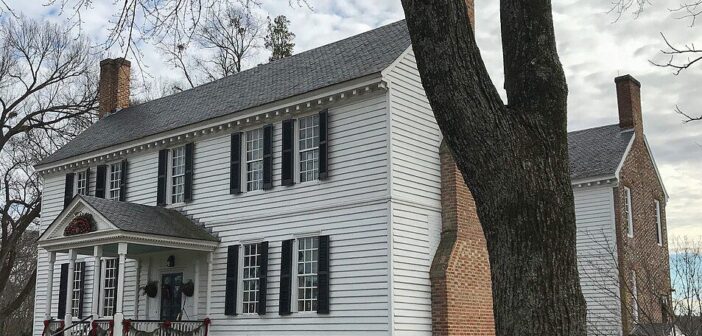A bizarre tale of first families, young love, rumors and murder in the heart of Virginia.
Farmville, Virginia, is a town of 7,000 near the banks of the Appomattox River. There are two colleges, Longwood and Hampden-Sydney, charming shops and a veil of history where events took place like General Lee’s retreat at the end of the Civil War and a 1951 civil rights strike, which was one of the Brown vs. Board of Education cases that went before the U. S. Supreme Court.
Most visitors, and I daresay residents, are unaware of the scandal in the 1700s that played out at a local plantation, a Dostoevsky-like tragedy with a script like any modern-day reality show. What adds to the drama is the story involved many members of Virginias’s First Families—FFVs as we Virginians refer to them—and names you may recognize: Randolphs, Harrisons, Jeffersons …
Like many scandals, it all started with love: a beautiful young girl and her handsome brother-in-law.
Anne Cary Randolph was born in September 1774 at Tuckahoe Plantation outside of Richmond to an aristocratic family. Her father, Thomas Mann Randolph Sr., was a soldier, statesman and landowner. He married his cousin, Anne Cary of Ampthill, and had 13 children. Indeed, Tuckahoe was Thomas Jefferson’s boyhood home. His mother was a Randolph.
Nicknamed Nancy, Anne was a bright, vivacious young lady, a reader, and as she grew up, she was considered quite the catch. Her teen years were ones of barbecues, dances, suitors coming to call—high 18th-century Southern living—until her mother died, and her father remarried the much younger daughter of an old friend. As is often the case, Nancy and her stepmother did not get along, and the stepmother threw Nancy out of the house. She went to live with her older sister Judith, who married her cousin Richard; the couple lived in Farmville on a plantation called Bizarre.
(To this day historians are unsure of the name; the French and English connotations of the word bizarre are very different and, at one point, some thought it may have been named for a Virginia wildflower in the region, though that was never proven.)
The author Alan Pell Crawford wrote the book Unwise Passions (Simon and Schuster, 2000) about the story behind what would become the trial of the 18th century. He said in a recent phone interview that years ago he had been researching the political life of Nancy’s brother-in-law, Congressman John Randolph, but the more he learned about the domestic life of the family, the more interested he became in Nancy’s story.
To understand these events, we must bear in mind the historical context. The political climate in the late 1700s was overheated, and for the tobacco aristocracy, it was a time of decline and economic collapse. Many of the children of the Founding Fathers looked down on hard work and were self-serving and irresponsible. In a lecture to the Virginia Historical Society in 2001, Crawford stated, “The great planters were living on credit extended on the presumed value of next year’s crop and they were being challenged by the mercantile North and in Virginia, by the rising class of lawyers and merchants. Even their local churches were no longer supported by taxes and were falling into disrepair. Anti-slavery sentiment was building and the position of the aristocratic families of the South was crumbling.”
Thomas Jefferson was prescient when he wrote in 1820, “I regret that I am now to die in the belief, that the … sacrifice of themselves by the generation of 1776, to acquire self-government and happiness to their country, is to be thrown away by the unwise and unworthy passions of their sons and that my only consolation is to be, that I live not to weep over it.”
In modern times, the quote attributed to the industrialist Andrew Carnegie said the same, “Three generations from shirtsleeves to shirtsleeves.”
Meanwhile, at a plantation like Bizarre, you have several young people only in their teens and twenties— living on their own in the middle of nowhere and probably not making the best decisions.
Amidst the turbulent social and economic environment, life played on at Bizarre. The younger brother of Richard, Theo, had proposed to Nancy and she accepted. Very romantic but unfortunately, he was sickly and within eight months he died. Meantime, there was gossip. Nancy and Richard, Judith’s husband, seemed awfully fond of each other.
So here you have Richard, the handsome one-time Princeton student who loved to party and didn’t like to work, and his beautiful sister-in-law who had always had quite an effect on the opposite sex. (Once at a party she saw a vase with the inscription, in French, “I must be sought.” She decided to make this her motto.)
The gossip crescendos. The pair were spotted kissing. It’s noticed Nancy is putting on weight.
During the fall of 1792, Richard, Judith, Nancy, John and cousin Archibald Randolph (who also had a crush on Nancy) traveled to Glentivar Plantation in Cartersville about 30 miles from Farmville to visit their cousins, the Randolph Harrisons. Nancy arrives, tired and sick and wrapped in a big cloak. She stays in a room adjoining that of Judith and Richard’s; the Harrisons are sleeping downstairs.
In the middle of the night, there was a terrible scream from Nancy’s room and Richard blocked her door, saying no one could go in. During the night, footsteps were reported to be heard going down the steps and outside.
The family returned to Farmville the next day and slaves reported not only seeing the corpse of a white baby on a pile of shingles in the yard, but also blood on the bed and staircase.
And that’s when the rumors started: Nancy and Richard had murdered their bastard child.
By the spring of 1793, both Nancy and Richard were ordered to appear at Cumberland Courthouse.
Richard was put in jail, awaiting trial and Nancy was put in the custody of John Marshall, the future Supreme Court justice and a Randolph as well, and the other attorney they had just convinced to come out of retirement for this case: Patrick Henry. (His fee was $500 guineas—very expensive for the time.)
The trial of the century began. Richard’s uncle Major Carter Page, a witness for the Commonwealth, testified the couple “were very good company for themselves and that he’d seen them embracing.” His wife, Mary, testified about Nancy’s weight gain and once asked her niece if she could examine her to see if she was still a virgin to which she was soundly denied. Mrs. Page also said she’d once peeked in Nancy’s keyhole and espied a very pregnant Nancy talking to her maid.
When Patrick Henry, who was a fierce cross-examiner, asked Mrs. Page if she was always studying her niece when she visited, Mrs. Page responded no but she felt it her duty “to find out about Nancy’s condition.” Henry asked if “Duty alone compelled you to look through a crack in the door as she prepared to retire?” Henry then asked her which eye she peeped with and said, “Great God. Deliver us from eavesdroppers.”
The drama continued. Patsy Jefferson, Nancy’s first cousin, daughter of Jefferson and married to Nancy’s brother, testified she had at one time supplied Nancy with gum guaiacum “for her colic.” It was common knowledge at the time this could cause an abortion.
Finally, it was Nancy’s sister’s turn to take the stand. Patrick Henry declared gossip had claimed a child was born that night and your husband went out with the baby and thrust it on a pile of shingles. What did you see?
“I saw nothing,” Judith testified. No, her husband never left her side and there is no way he could have passed through their bedroom with a baby in his arms. She had not been able to sleep well that night, not to mention Nancy was in the adjoining room. This never happened she said, perjuring herself. After all, family honor came first.
There may have been many suspicions, but 16 gentlemen justices dropped all charges against Nancy and Richard. Bear in mind that under Virginia law at the time, slaves were not allowed to testify.
And so the family returned to Farmville. It doesn’t take much to imagine the dynamics in the household afterward: the jealous unhappy older sister; the young lovers who can’t be together; the eccentric backbiting congressman; the two sons of Richard, one a deaf-mute; the slaves.
A cauldron.
What makes Crawford’s book so interesting is he lets the reader play detective. “I wasn’t out to prove the case. Wasn’t out to make an argument,” he said. “This isn’t an open and shut case. It’s a real mystery.”
The story, of course, didn’t stop at the trial.
Within three years, Richard died of an inflammatory fever so more rumors started about his mysterious death and how he may have been poisoned, rumors the Congressman probably encouraged because he hated Nancy (had she spurned him too?) and he was convinced she had murdered his brother. Nonetheless, Crawford refutes this. He cited the poor health and hygiene conditions of the times and that most doctors lived a long way away.
Not surprisingly, after Richard’s death, Judith began showing how she truly felt toward her younger sister, and treated her like a servant, even expecting her to empty the chamber pots. Finances were tight at Bizarre and John’s political career certainly had not helped.
Eventually, John throws Nancy out of Bizarre because he is convinced she killed his brother. She is 31 years old and broke with few places to go.
With no prospects, now considered a fallen woman, Nancy travels to Richmond and sleeps on a pallet at the abandoned Tuckahoe Plantation, stays at different homes and finally rents a room from an unsavory couple who ran an amusement park. More rumors: She is a prostitute, although Crawford refutes this.
Nancy, needing a fresh start, decides to move to New York City and rents a room at old Mrs. Pollacks’s boardinghouse in Greenwich Village. About the same time her sister and the congressman have a falling out and he moves to his own home called Roanoke Pla
For Nancy, her luck begins to change. Gouverneur Morris, an old friend of Nancy’s father who remembered her as a child, hears she is in the city and begins visiting and sending her letters. Given her station in life, she must have been more than flattered, especially since he seems very kind, encouraging her not to dwell on the past. Morris, rich, a lawyer, a statesman, was considered a Founding Father. He had many accomplishments, which included signing the Articles of Confederation and the U.S. Constitution, serving in the Continental Congress and in France as a minister.
Within a short amount of time, Morris offers Nancy a job as his housekeeper at his estate Morrisania where he leases farmland on the Harlem River. Nancy accepts the job and moves.
On December 25th, 1809, at Christmas dinner, unbeknownst to his family, Morris had summoned a clergyman who married the couple. Within two years, Nancy was pregnant and delivered a son, Gouverneur Morris II.
Within a few years, Judith’s son Tudor, while attending Harvard, began having serious health problems with consumption. The Morrises invited him to come stay with them, hiring a doctor to help him recover; they also invited his mother and Uncle John to visit and during the visit, Tudor mentioned Aunt Nancy was entertaining herself with “lewd amours,” tattle his uncle seems to have ignored.
As time went on, Congressman Randolph and Judith joined forces with Morris’s nephew David Ogden, who was scheming to get his uncle’s money and certainly didn’t want Nancy and her son in the way. The Randolphs had their own reasons for vengeance. The campaign began.
The Congressman wrote Gouverneur Morris and others, mentioning all the old slanders, even throwing in that Nancy had been thrown off Bizarre because she was having an affair with a slave. He warned Morris’s life was in danger and he saw “a vampire, that after sucking the best blood of my race, has flitted off to the North and stuck her harpy fangs into an infirm old man” and Morris had better wake up “unless he too die of cramps in his stomach” referring to Richard’s death. The Congressman had recently had a bad fall and carriage accident and with the opium he was accustomed to using, this probably did nothing for his mental health.
Morris wrote the letters off, these accusations were nothing new, but Nancy responded with a vitriolic to-the-point letter. She may have had the upper hand insofar as she sent her response to many of John’s political enemies.
At one time, Nancy had planned a trip to Virginia, though by then her husband was in poor health. Toward the end, he had a painful urinary tract blockage, which he tried to remove with some whalebone probably from one of his wife’s corsets and gave himself a bad infection that killed him.
Morris’s love for Nancy was certainly reflected in his will. He left her the estate and an income, the residue going to his son. If their son died prematurely, Nancy would designate money to his nieces and nephews, all those rapacious relatives, as she saw fit. He even left her an income in case she should marry again. In a word, this was not the will left by someone who thinks his wife is a deranged murderess. =His love for Nancy was evident.
The Morrises must not have been bad parents. Their son grew up to be the president of the New York and Harlem Railroad; a founder of the Illinois Central and Union Pacific Railroad; further, he was an anti-slavery Republican. He eventually married Patsy Jefferson Cary, the daughter of Nancy’s sister Virginia.
Nancy died at Morrisania in 1837 and four years later, her son built St. Ann’s Episcopal Church on the grounds of the old estate where Nancy and her husband are buried. The mansion has been torn down, yet the church survives in a poor South Bronx neighborhood and ministers to residents with a large food pantry, soup kitchen and clothing bin.
Life tends to come full circle.
When I was researching this piece, I convinced myself Nancy and Richard were guilty of murder and Nancy possibly poisoned her lover. Now, I am not so sure.
Crawford said what clinched the truth for him was a series of letters Nancy wrote when looking back at the tragedies of her life. As he referenced in Unwise Passions, “In the summer of 1830, one of her Morris in-laws saw St. George Randolph, who was nearly forty and “looks wretchedly.” (Bear in mind, this is the deaf-mute son of Richard and Judith.) Nancy writes it was “fortunate indeed … for mankind that the wisdom and mercy of God determined (that that branch of the Randolphs) should soon be extinct. She believed that God’s judgment had been obvious. That “the nature of St. George’s malady” was no mystery; vis-a-vis the illness one “beheld what the father attempted visited on his child.” Crawford believes this may indicate Nancy and Richard knew exactly what happened and Richard had pressured her to remain silent.
Nancy carried the torch for Richard her whole life and wrote and spoke of him fondly. Although many tried to pretend her betrothed Theo had fathered her child during their engagement, Crawford thinks it’s highly unlikely; he was just too ill. On Richard’s deathbed, he described Nancy as “the only sincere friend he ever had” other than his stepfather.
In later letters, she wrote “I do think his Nature made of the best materials,” but he had made one tragic mistake and married “a coldhearted, malignant haughty woman” who did not understand him.
Crawford thinks the baby born of the Nancy/Richard affair was probably stillborn although one can never be sure. “Nothing is black and white in this story and it’s the possibilities that give the story richness,” he said.
Tyler Scott is a writer who lives in Blackstone, Virginia. Read her previous stories in Deep South here.


